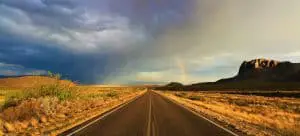Hiking With Food In Bear Country (Is it SAFE?)

If you’re a hiker who really likes to get out in the backwoods, chances are you’ve come across some of the local wildlife at some time or another. You’ve probably come across some birds, deer, and other small animals, but have you ever seen a bear?
While deer and birds are oftentimes the least threatening wildlife, bears have the capacity to be a bit more rough and tough when it comes to human interaction, especially if they can smell any food you may have packed for your hike.
If you do choose to hike with food in bear territory, there are a few vital precautions you must take to keep yourself and the bears as safe as possible.
Quick Links
Bears and Food Safety
Bears consuming human food can lose their preference for their natural diet of plants and meat. This can have a very negative effect on the bears causing obesity as well as an audacious attitude in approaching humans for their food.
Bears are natural predators, far bigger than humans, and have the ability to be extremely aggressive and unpredictable – especially grizzly bears. Those bears who are too comfortable eating human food can be a very dangerous threat to humans and oftentimes must be euthanized in order to keep the surrounding communities safe.
To avoid this situation, parks and other wildlife reserves have instated specific food storage requirements and regulations to keep humans and bears as safe as possible.
Food storage regulations will often vary by park depending on what kind of bears are known to be present in the area. Some parks require visitors to store their food in food lockers or special bear-proof containers to prevent bears from rummaging in food or garbage.
How To Stay Safe With Food In Bear Country
Always keep the food within arm’s distance
When you’re eating your food in bear territory, never set your food down any further than arms distance. In the event that a bear decides to crash the party, you’ll want to be able to save your meal for yourself rather than have a bear picking off your plate.
Never store food in your tent or backpack
No matter how expensive your tent and backpack may be, it’s likely that they are no match to the claws and jaws of a 500-pound bear. Bears will not hesitate to destroy your belongings for the opportunity to eat your leftovers. If you must step away from your food, be sure to store them in a bear-proof food locker or a bear canister at least 200 feet away from your campsite.
Wash any dirty dish immediately after using
You wouldn’t leave dirty dishes in your sink if you knew there was a roach problem in your home. The same thing goes for hiking and camping in bear territory. A bear can smell leftovers from miles away, and if you leave out any dirty dishes from your meal, they’ll be drawn to your campsite like a moth to a flame. Clean any dishes IMMEDIATELY after use to keep bears away from your campsite.
Do NOT dispose of your food in the wilderness
You may think you’re doing nature a favor by treating it to some nutrient compost, but all you’re doing is creating a honey trap for bears to fall right into. Any uneaten food scraps MUST go directly into designated trash areas.
Use bear canisters
The safest thing you can do to protect your food from bears is to invest in bear-proof canisters. They’re shatterproof and prevent any food’s scent from escaping and attracting bears.
Hiking Safely in Bear Country
The good news is that most bears, especially black bears, will often go out of their way to avoid interacting with humans. However, just because bears are naturally afraid of humans doesn’t mean that there isn’t a good bunch who have a bit more courage than the lot. This is especially prevalent in areas where bears are prone to seeing humans more frequently, such as hiking trails.
If you’re contemplating hiking in bear country, here are some tips to keep as safe as possible:
Do not leave your pack unattended
This is especially important if you have food in your bags and backpacks. Leaving your bags unattended can pique the curiosity of a wandering bear if they can detect the scent of food from your bag. Always keep your bags within arm’s distance when hiking in bear territory
Keep your bear repellent handy
Bear repellant acts like pepper spray, reminding bears that they should stay away from humans. Essentially, it’s like mace for bears and can be incredibly helpful if you find yourself in a close encounter with a bear when the typical advice to “stand your ground” wouldn’t be possible.
Never travel alone in bear country
When you’re in bear territory, it is always safest to travel in a pack rather than solo, as it’s far less likely that a bear will approach a group of people than a stand-alone human. The same applies to most wildlife.
Make a lot of noise
A bear is less likely to approach if you and your group make a lot of noise, such as clapping, shouting, whistling, what have you. It may seem counterintuitive to what you want to do to keep bears away, but since bears are naturally afraid of humans, the more humans they think are on the way, the more they will stay at bay.
Be aware of your surroundings
Certain areas in nature reserves are more likely to be a bear hot zone. Areas with running water or places with dense vegetation are places where bears tend to frequent. Try to avoid these areas if you find yourself in bear territory.
Keep your children and dogs close
Never allow small children or dogs to stray too far away from you while hiking in bear territory. These bears are not the cute and cuddly kind that your child might sleep with at night, and a bear is very likely to outpower even the bravest of dogs.
Keep your dogs on a tight leash when hiking out in bear country. If you bring your small children with you into bear territory, consider equipping them with a kid-friendly leash for safe measure.
Keep to the trail
Bears are less likely to approach the area that they know humans are likely to be around, such as popular hiking trails. If you decide to traverse off the designated trail, you put yourself at a higher risk of having a bear encounter.
Hike during daylight hours
Bears will typically be the most active during early morning and late afternoon hours. To decrease the chance of a bear encounter, stick to hiking during bright daylight hours. This also applies to much other wildlife as well. Most animals you’ll encounter out in the wilderness are nocturnal, so you’re less likely to see them if you stick to daytime hours.
Look for Signs of Bears
Before you hike in bear territory, you should become familiar with looking out for signs of bears nearby. Some signs include scratches on trees, paw tracks, and bear poop. Different kinds of bears can leave different signs, so you should also become familiar with what type of bear is lingering in the area of your hike.
Do not wear scented lotions or perfumes
Wearing any heavy scent while out in bear territory is going to do nothing but attract a bear’s curiosity. Play it safe and opt for an unscented lotion when you’re out on the trails.
Encountering a Bear: What To Do
Even if you’ve taken all the proper steps to avoid bears, you can still find yourself in a situation where you come face-to-face with one. If this does happen, here are a few tips on what to do:
Do not run
Bears can reach speeds of up to 35 miles per hour, so unless you’re an Olympic sprinter, you will not outrun a bear. Not to mention the sudden movement might trigger a bear’s predatory instincts.
Give the bear at least 100 feet of space
If you get any closer than that, the bear will automatically detect you as a threat. If you find yourself within that 100-foot range, try your best not to startle the bear. Slowly and safely back away as you get yourself at least 100 feet away from the bear.
Let the bear know you’re around
It may seem the opposite of what you should do when encountering a bear, but making your presence known is one of the most effective methods to get a bear out of your way. Unlike making loud noises when you’re out on the trail actively avoiding bears, you should use calm and gentle sounds to quietly let a bear know you’re close by as not to startle them and have them perceive you as a threat.
Keep your bear repellent handy
If all else fails and you sense that the bear is getting too close for comfort, do not be afraid to spritz the bear with your repellant as a firm reminder to stay away from humans. When you use bear repellant, you’re not only helping yourself, but you’re also helping to keep the local wildlife intact and peaceful by limiting the usage of firearms that other people might find more appropriate to use when in a close encounter with a bear.
Conclusion
Proper food storage techniques while hiking out in bear country can sometimes mean life or death for you and the bears that inhabit the territory. Remember to always keep your food in the appropriate storage units and canisters to keep them away from you while you’re camping and hiking.
When you practice these proper food storage procedures, you’re helping to keep peace in bear territory and the peace between bears and humans. If a bear does manage to get into your food, do not hesitate to contact the proper authorities so they can help you clean up the mess and relocate the bear if need be. Following these tips will help to ensure that you have a safe and enjoyable experience while hiking in bear territory.






